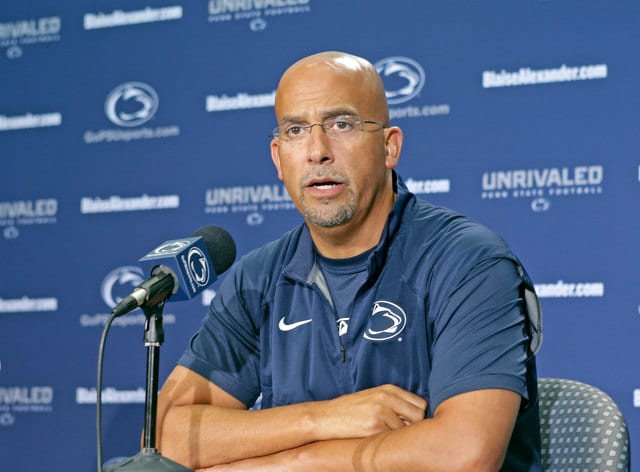
no description

no description
This story has been updated with a statement from Penn State Health
A former Penn State football team physician alleges in a new lawsuit that he was relieved of his duties after reporting that Coach James Franklin attempted to influence and interfere with decisions about medically clearing players to return to action.
Dr. Scott Lynch, a Penn State Hershey orthopedic surgeon who until March served as football team physician and director of athletic medicine, filed the lawsuit on Friday in Dauphin County against Penn State, Franklin, Athletic Director Sandy Barbour, Senior Associate Athletic Director Charmelle Green, Chair of Orthopedics and Rehabilitation Kevin Black, Penn State Health and Penn State Hershey Medical Center.
‘On multiple and repeated occasions, … Franklin attempted to interfere with [Lynch’s] autonomous authority to determine medical management and return-to-play decisions related to student-athletes,’ the complaint, filed by Lynch’s attorney Steven Marino, states.
The Big Ten and NCAA have policies and standards to prevent coaches from having a role in or influencing the hiring of medical staff or inappropriately influencing the treatment of athletes, according to the lawsuit.
Franklin, Lynch claims, ‘created a culture and climate which, at a minimum, obstructed full compliance with the aforementioned standards and rules implemented to safeguard the medical management of student-athletes.’
Lynch, a former Penn State wrestler who has been employed by Hershey Medical Center and Penn State College of Medicine since 1997, says that he ‘refused to relent to the attempts of … Franklin to influence and interfere,’ and reported his concerns to Black, Barbour, Green and the university’s athletic integrity officer, Robert Boland.
The 43-page lawsuit does not detail any specific instances of Franklin’s alleged interference.
In January, the lawsuit claims, Barbour and Green ‘communicated a demand’ to Black, Lynch’s supervisor, that Lynch be removed from his duties with the athletic department. They also allegedly said they considered exercising a ‘termination without cause’ in the athletic department’s medical services agreement if Lynch was not removed from his roles with the team.
On Jan. 28, Black informed Lynch that he was relieved of his athletic department duties. Dr. Wayne Sebastianelli, who held the position prior to Lynch, returned as a director of athletic medicine in March. Dr. Peter Seidenberg, who joined Lynch as a team physician in 2013, remains in that role, according to the Penn State football media guide.
Lynch says he believes that his dismissal from athletic duties “arose as a result of the undue and improper influence exercised by… Franklin over the supervision of the Lynch’s professional assignment.’
He also alleges that his removal was ‘an attempt of the university defendants to avoid scandal.’ The lawsuit claims the defendants created ‘a false narrative’ that the decision to relieve Lynch of his duties “was based upon an interest in having orthopedic contract services rendered by an orthopedic surgeon who resided in State College, PA as opposed to Hershey, PA.’
The complaint says the defendants conspired to create that narrative to cover for retaliation against Lynch for his ‘good-faith reporting,’ made within the provisions of the Pennsylvania’s whistleblower law.
A statement from Penn State Health said the university rejects the claims of the lawsuit.
‘In February 2019, Penn State Health administrators decided to change leadership for athletic medicine and the delivery of care for Intercollegiate Athletics. This transition was completed with the best interests of student-athletes in mind, given the increasing complexity and growing demands of sports medicine, as well as health care in general,’ the statement said. ‘While we reject Dr. Lynch’s claims and will vigorously defend our program and its representatives, we remain grateful to him for his five years as director of athletic medicine for Intercollegiate Athletics and for his continued association with Penn State Health.’
The lawsuit claims multiple counts of violation of the whistleblower law, conspiracy to violate the law and retaliation.
Lynch is seeking in excess of $50,000, plus compensatory and punitive damages.
Receive all the latest news and events right to your inbox.


80% of consumers turn to directories with reviews to find a local business.